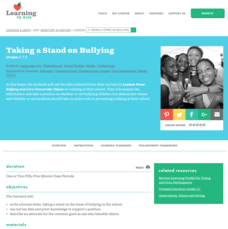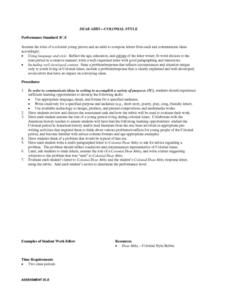Virginia Department of Education
Determining Purpose and Audience
Build the writing skills of your junior high wordsmiths with activities that introduce many essential skills of writing. As a class, they develop working definitions of formal vs. informal writing, explore different categories of...
Curated OER
Life's Greatest Pleasures
Students explore the meaning of what makes life pleasurable. In this social awareness lesson, students read an article that states things that people might enjoy doing for pleasure, then complete numerous activities to reinforce what...
Curated OER
Time for All Ages
Fourth graders discover time keeping by analyzing technological advances in history. In this time lesson, 4th graders create and complete a KWL chart based on their research of a famous timekeeping invention, such as a sundial....
PBS
Stories of Painkiller Addiction: The Cycle of Addiction
Drug addiction, including prescription drug addiction, begins with a reason that's different for every user. High schoolers learn more about the reasons people begin abusing drugs with a set of videos and worksheets that discuss four...
Curated OER
A South African Storm
Young scholars read "A South African Storm" by Allison Howard and participate in a class discussion that examines Howard's letter for both content and writing form. They write a letter using some of the techniques they identified in...
Curated OER
Taking a Stand on Bullying
Middle schoolers stand up against bullying in a character-building instructional activity. After discussing historical figures who became advocates in times of adversity, they brainstorm ways to end bullying at their own school, and use...
Curated OER
Aesop's Fables
Examine the fables of Aesop with your class. Pupils identify the morals of fables and role-play a scene from their favorite fable of Aesop. Additionally, they compose letters to a favorite character in the fable. Learners role-play again...
Curated OER
Postcards For Your Ears
Here is a great way to have your students make audio postcards to share by recording a message on the computer. They write and revise an appropriate message about an object from home, choose a background, and font colors for the...
Curated OER
Veterans Day
First graders examine the history and significance of Veteran's Day. They discuss each of the military branches and how Veteran's Day was started, and write a thank you letter to a Veteran. Students copy the greeting and closing of the...
Hawaiʻi State Department of Education
Picture Poetry
What a fun idea! The class discusses, and then writes free-verse poems using sensory detail. They get into small collaborative writing teams to compose their poems. Next, they pantomime the actions from the poem while their teammates...
Curated OER
Nous Nous Souvenons: French-Canadians
Students research the French-Canadian influence in northern New York. They interview families of French-Canadian descent, research immigration history, visit a French restaurant, write narratives about their experiences interviewing...
Curated OER
Canada - US: Approaches to Immigration
Sixth graders explore the Canadian immigration experience through comparison and contrast to American immigration and settlement patterns. In this immigration patterns lesson, 6th graders dialogue their opinions regarding immigration....
Virginia Department of Education
Deciding the Mode
Are your young writers having difficulty distinguishing between expository and persuasive writing? Discuss the difference between the two, and how some prompts can be responded to in either fashion. Included here is a simple lesson plan...
Curated OER
Alexander and the Terrible, Horrible, No-Good, Very Bad Day
Second graders interact with the story of Alexander's horrible day by connecting it to their lives. They practice predicting, writing paragraphs, reading aloud, discussing his problems, making a card to cheer him up, and designing a pair...
Curated OER
Looking and Learning in the Art Museum
Reflect on the art your class can view at a museum. For this art history lesson, young scholars draw six elements of art. They discuss original art versus reproduction artwork and write about their thoughts of a museum. It would be...
Curated OER
Persona
Young scholars write three fictitious letters each on the same topic but to three different persons. They compare letters to decide how the voice of the writing changes depending on the person who is receiving the letter. They apply this...
Curated OER
Dear Abby- Colonial Style
Students review the Colonial period in American history and read literature from this era. They assume the roles of a colonial young person and an adult to compose letters from each and communicate their ideas through the letter writing...
Curated OER
The Time I Got Lost
Third graders go through the writing process but substitute paper and pencil with the computer to create a story about "The Time I Got Lost".
Curated OER
Our Picture and Word Book
Create a fun song for your young learners! It should include each of their names and use rhyme to make it memorable. Then show the class a picture dictionary, and have learners make their own class dictionary! If you have time, consider...
Curated OER
Relations and Graphs
Here is a simple, yet clever lesson on how to teach the important concepts of greater than, less than, and equal to. Pupils write their names down on grid paper - one letter per box. They compare their names and find a name that is...
Curated OER
Landscapes of the Mind
High schoolers review Emily Dickinson's biography and examine themes and forms of some of her poems. They measure ways Graham integrates aspects of Dickinson's life and the themes and forms of her poetry into Letters to the World.
Curated OER
A Way with Words or Say What?
Students explore the language of Shakespeare. In this literature lesson, students examine words invented by Shakespeare as they interpret their meanings in drawings. Students pantomime the meanings and then write a short story...
Children's Commissioner for Wales
Special Mission — Our Rights
Introduce young learners to the list of children's rights as defined by the UN Convention on the Rights of the Child (UNCRC) with a series of activities that get class members thinking about what they need to grow up safely and happily.
Curated OER
Susan B. Anthony Day
The history of women's suffrage and Susan B. Anthony are examined in this social studies instructional activity. Third and fourth graders participate in a simulation of a vote, develop slogans for women's suffrage, complete a KWL chart,...

























